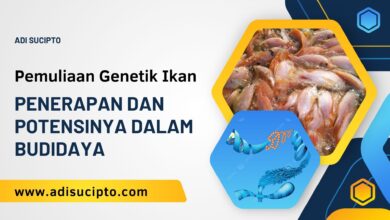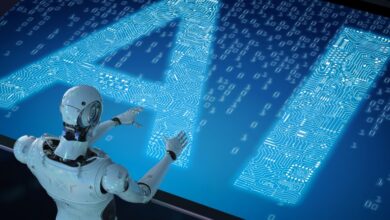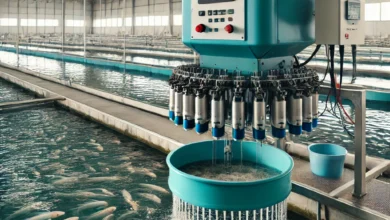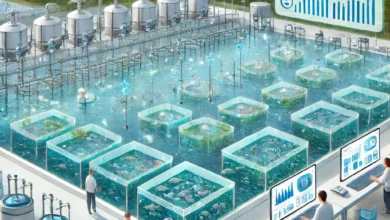10,000 Hours to Become an Aquaculture Expert?
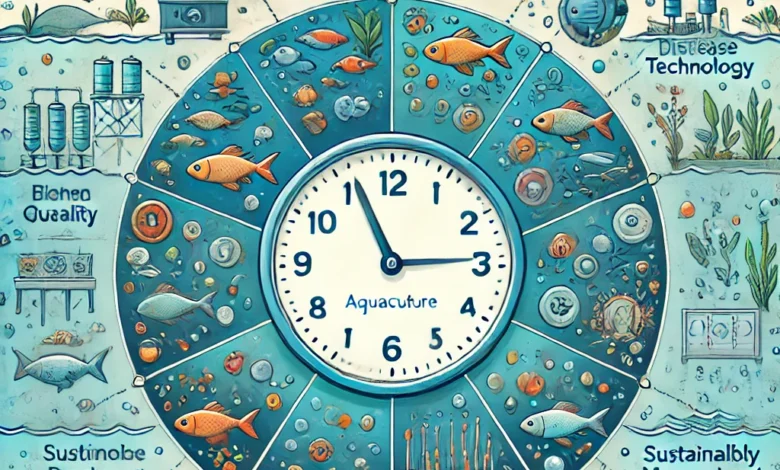
Introduction
Aquaculture, or the cultivation of aquatic organisms such as fish, shellfish, and seaweed, is an increasingly important practice in the effort to meet the growing global food needs. According to Adi Sucipto, aquaculture can be defined as the embodiment of ideas, feelings, and intentions in improving the quality, quantity, and continuity of aquatic organisms resulting from interaction with their limited environment. This definition underscores that aquaculture is not just about cultivation techniques, but also involves a deep philosophy about how humans interact with the aquatic environment.
In a world that continues to evolve with the need for sustainable food solutions, aquaculture emerges as one of the best answers. This industry not only enhances production without harming the environment but also provides room for significant technological innovation. From water recirculation systems to biofloc technology, every element in modern aquaculture is designed to achieve a balance between productivity and sustainability.
However, behind every technological success and efficiency improvement, there is a fundamental need for expertise that cannot be achieved through theory alone. Expertise in aquaculture requires significant time investment and dedication to understanding every aspect of the cultivation process—from water quality management to nutrition and fish health management. This is a long journey that demands more than just technical knowledge; it is a journey that requires an individual to truly merge with the environment and the organisms they manage.
The 10,000 Hour Theory
The 10,000-hour theory, popularized by Malcolm Gladwell in his book “Outliers,” states that to become an expert in any field, one must spend at least 10,000 hours in focused and repetitive practice. This theory emphasizes that true expertise cannot be achieved through natural talent alone; instead, it requires continuous and directed practice.
In the context of aquaculture, this theory is relevant because it highlights the importance of hands-on experience in the field. Every hour spent by fish farmers in monitoring water conditions, managing feed, or handling fish health issues is an essential part of the journey toward expertise. These are the hours that build intuition, deepen understanding, and shape the ability to make correct decisions in complex situations.
Expertise in aquaculture is not limited to mastering certain technologies or cultivation techniques. It also involves a deep understanding of aquatic ecosystems and how interactions between various elements in the system can affect the final outcome. Fish farmers who have spent their 10,000 hours in this field will have an intuitive understanding of when to adjust certain parameters, how to manage resources efficiently, and how to mitigate potential risks.
Education and Training in Aquaculture
For many entering the world of aquaculture, their 10,000-hour journey begins with formal education. Academic programs in aquaculture typically cover a range of disciplines, including aquatic biology, water quality management, cultivation technology, and environmental science. This curriculum is designed to provide a solid foundation in basic sciences, as well as the practical skills needed to succeed in this industry.
Internships and field training are crucial components of aquaculture education, providing students with the opportunity to apply the theories they learn in real-world situations. Every hour spent in the field, whether monitoring fish ponds, analyzing water quality data, or working in a hatchery, adds a layer of experience that cannot be replaced by classroom learning.
However, for many fish farmers, the journey towards expertise begins outside the classroom, in their own cultivation fields. They may not have a formal academic background, but they compensate for this with direct field experience. Every harvest season, every cultivation cycle, and every challenge faced is part of their ongoing education.
This practical experience often teaches more than theory. For instance, fish farmers learn how to manage risks by making quick and correct decisions based on constantly changing field conditions. They also learn how to cope with failures, which are an integral part of the learning process. When harvests fail or unexpected disease outbreaks occur, experienced fish farmers not only learn from these mistakes but also develop resilience and the ability to bounce back.
Technology in Modern Aquaculture
In today’s era, technology has become an integral part of aquaculture, helping to enhance efficiency and productivity while reducing environmental impact. Recirculating aquaculture systems (RAS) are one example of technology that has revolutionized how fish farmers manage water and cultivation environments. RAS allows the reuse of water by filtering and continuously cleaning it, reducing the need for fresh water and enabling better environmental control.
Biofloc technology is another innovation that has transformed the aquaculture landscape. In biofloc systems, microorganisms are used to break down organic waste in the water into materials that can be reused by fish as food. This not only improves feed use efficiency but also helps maintain stable water quality, which is crucial for fish health. For fish farmers, mastering biofloc technology requires an understanding of microbiology and the ability to manage the biological processes occurring within the system.
Alongside RAS and biofloc, genetic engineering techniques have also opened new opportunities in aquaculture. Using technologies like CRISPR, scientists can modify fish genes to enhance desired traits, such as disease resistance, faster growth rates, or better feed conversion efficiency. For fish farmers, understanding and applying this technology can mean the difference between success and failure in facing challenges such as deadly diseases or unpredictable market fluctuations.
Nanotechnology also plays a significant role in modern aquaculture, with broad applications ranging from water quality monitoring to filtration efficiency enhancement. Nano sensors, for example, can detect changes in water quality parameters with very high precision, allowing fish farmers to take corrective actions quickly before problems escalate into crises. Nano filtration, on the other hand, allows water purification on a very small scale, which is essential in dense cultivation environments.
Understanding quantum mechanics, although still in the research stage, opens new opportunities for water quality management and fish health. New materials developed through quantum research have the potential to enhance efficiency in absorbing pollutants or controlling biological processes at the molecular level. This technology, though still in the future, promises more sophisticated solutions to the challenges faced by the aquaculture industry.
Internet of Things (IoT) in Aquaculture
The Internet of Things (IoT) is another technology that has brought significant changes in how aquaculture is managed. With IoT, various sensor devices can be integrated into the cultivation system to monitor various environmental parameters in real-time. For example, IoT sensors can be used to measure water temperature, dissolved oxygen levels, pH, and salinity, providing live data to fish farmers via mobile devices or computers.
With this real-time data, fish farmers can make quicker and more accurate decisions regarding cultivation environment management. For example, if the oxygen level in the water drops below a safe threshold, the IoT system can send an alert to the fish farmer to add aeration immediately. Additionally, IoT allows for the automation of some processes, such as feeding, which can be performed based on a predetermined schedule or in response to specific environmental conditions.
IoT also plays a crucial role in tracking and managing fish stock. Using RFID tags or other sensors, fish farmers can monitor individual fish growth, accurately count stock numbers, and ensure that fish are in optimal health conditions. This data not only assists in daily decision-making but also provides long-term insights into the effectiveness of cultivation practices being implemented.
With IoT, aquaculture becomes more efficient, more transparent, and more responsive to changing environmental conditions. Fish farmers who master this technology will be at the forefront of creating cultivation systems that are not only productive but also sustainable.
Overcoming Challenges and Building Expertise
Although technology plays a crucial role in modern aquaculture, becoming an expert in this field still requires more than just mastery of tools and techniques. The challenges in aquaculture are many and varied, ranging from deadly fish diseases to climate change affecting water quality. Facing these challenges requires sharp intuition, extensive experience, and mental resilience—all qualities built through years of experience in the field.
One of the biggest challenges in aquaculture is managing the risks associated with fish diseases. Diseases can spread rapidly in dense cultivation environments and often require a quick and accurate response to prevent significant losses. Experienced fish farmers will have knowledge of early signs of disease, as well as effective prevention and management strategies. They will also have a strong network with veterinary experts and fish health service providers, who can provide additional support when needed.
Additionally, climate change is another significant challenge faced by the aquaculture industry. Changes in water temperature, rainfall, and wind patterns can all affect water quality and fish health. Expert fish farmers will closely monitor weather conditions and be ready to adjust their cultivation practices according to changing environmental conditions. They may also invest in infrastructure more resistant to extreme weather changes, such as shading or additional heating/cooling systems for cultivation ponds.
Moreover, successful fish farmers are those who can innovate and adapt quickly to changing market conditions. Prices for fish and other aquaculture products can fluctuate based on market demand, regulations, and other factors. Experienced fish farmers will have product diversification strategies and the ability to adjust their production quickly according to changing market conditions.
In facing these challenges, fish farmers who have achieved their 10,000 hours will have a significant competitive advantage. They will not only have the technical knowledge required to manage their operations efficiently but also the ability to make correct decisions in complex and uncertain situations. They will become leaders in the industry, optimizing their production outcomes and contributing to the long-term sustainability of aquaculture itself.
Continual Learning and Innovation
Becoming an expert in aquaculture does not mean stopping learning. The industry continues to evolve, with new technologies and best practices emerging constantly. Continual learning is key to maintaining expertise and relevance in an ever-changing industry. Those committed to continuous learning and innovation will always be at the forefront, ready to take advantage of new opportunities and face emerging challenges.
Successful fish farmers often attend advanced courses, seminars, and industry conferences to update their knowledge on the latest technologies and market trends. They are also active in professional networks, sharing knowledge and experiences with their peers, and participating in research and development that contributes to the industry’s advancement.
Innovation is another key element in the journey towards expertise. Innovative fish farmers are always looking for new ways to improve efficiency, reduce environmental impact, and enhance the quality of their products. They may develop new cultivation techniques, adopt new technologies, or create new products that meet the evolving needs of the market.
Innovation can also come in the form of better management. Successful fish farmers are those who can effectively manage their teams, optimize resource use, and create a productive and sustainable work environment. Good leadership, correct decision-making, and the ability to adapt to change are qualities developed during their 10,000-hour journey.
Conclusion
In the world of aquaculture, expertise is the result of a combination of knowledge, experience, and innovation. The 10,000-hour theory emphasizes that to become an expert, one needs to invest significant time and effort in focused and continuous practice. However, expertise in aquaculture also requires a deep understanding of technology, the ability to face and overcome challenges, and a commitment to continual learning.
For those committed to achieving expertise in aquaculture, the 10,000-hour journey is a challenging but opportunity-filled journey. With every hour spent, every experience gained, and every innovation applied, they come closer to their goal of becoming experts who not only master operational techniques but also have a vision for the future of the industry.
Aquaculture is an ever-evolving industry, with new challenges and opportunities emerging daily. Those who have achieved their expertise will not only succeed in their own operations but will also become leaders who help steer the industry towards a more sustainable and innovative direction. With a commitment to lifelong learning and a dedication to continual innovation, they will become agents of change who help create a better future for aquaculture and the world as a whole.
